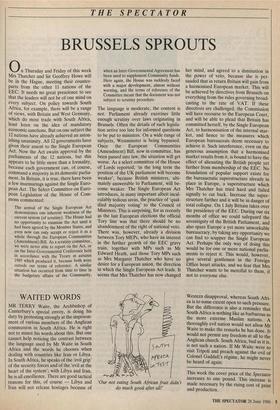WAITED WORDS
The language is moderate, the content is not. Parliament already exercises little enough scrutiny over laws originating in Brussels. Often the details of such legisla- tion arrive too late for informed questions to be put to ministers. On a wide range of subjects, Westminster is being bypassed. Once the European Communities (Amendment) Bill, now in committee, has been passed into law, the situation will get worse. As a select committee of the House of Lords repcirted, 'in the long term the position of the UK parliament will become weaker', because British ministers, ulti- mately answerable to Parliament, will be- come weaker. The Single European Act introduces, in many important albeit incal- culably tedious areas, the practice of 'qual- ified majority voting' to the Council of Ministers. This is surprising, for as recently as the last European elections the official Tory line was that there shoUld be no abandonment of the right of national veto. There was, however, already a division between Tory MEPs, who have an interest in the further growth of the EEC gravy train, together with MPs such as Mr Edward Heath, and those Tory MPs such as Mrs Margaret Thatcher who have no desire for a European union, the direction in which the Single European Act leads. It seems that Mrs Thatcher has now changed `Our not eating South African fruit didn't do much good after all!' her mind, and agreed to a diminution in the power of veto, because she is per- suaded that in return Britain will gain from a harmonised European market. This will be achieved by directives from Brussels on everything from the rules governing broad- casting to the rate of VAT. If these directives are challenged, the Commission will have recourse to the European Court, and will be able to plead that Britain has committed herself, by the Single European Act, to harmonisation of the internal mar- ket, and hence to the measures which European bureaucrats deem necessary to achieve it. Such interference, even on the generous assumption that a harmonised market results from it, is bound to have the effect of alienating the British people yet further from membership of the EEC. No foundation of popular support exists for the bureaucratic superstructure already in place in Europe, a superstructure which Mrs Thatcher has tried hard and failed signally to cut back. Increase the super- structure further and it will be in danger of total collapse. On 1 July Britain takes over the presidency of the EEC. During our six months of office we could safeguard the sovereignty of the British Parliament, and also spare Europe a yet more unworkable bureaucracy, by taking any opportunity we can find to scupper the Single European Act. PerhaOs the only way of doing this would be for one or more national parlia- ments to reject it. This would, however, give several gentlemen in the Foreign Office heart attacks, and we fear that Mrs Thatcher wants to be merciful to them, if not to everyone else.
Western disapproval, whereas South Afri- ca is to some extent open to such pressure. But the difference is also a reminder that South Africa is nothing like as barbarous as the more extreme Muslim nations. A thoroughly evil nation would not allow Mr Waite to make the remarks he has done. It would not permit any freedom at all to the Anglican church. South Africa, bad as it is, is not such a nation. If Mr Waite were to visit Tripoli and preach against the evil of Colonel Gaddafi's regime, he might never be heard of again.


















































 Previous page
Previous page